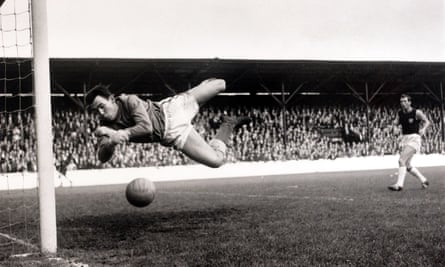Leicester City 5, West Ham United 4: it was quite a match to kick off half a century on the highways and byways of football, writing more as a neutral fan than hard-nosed reporter. The ground was Filbert Street, the date 27 August 1966, four weeks after England won the World Cup. Ron Greenwood’s pledge to attack meant “Banks saw nearly as much of Moore and Peters as he did at Wembley”. Hurst beat him twice but it was not enough. Players did not have Christian names then. Now they have forenames. And games may be goalless.
The 70s began at Craven Cottage “in some ways just like the early 50s for there was Haynes, a hair or two greyer, still turning on a sixpence and spraying out passes like stars from a catherine wheel. Who would have thought 18 years ago the coin might pass from circulation before the master?” There was also “a brief delay while the referee sent for a skewer to fix a goal-net. A foot, with man attached, briefly substituted.” The game moves on. Now there are fourth officials and VARs in waiting.
Three months previously the referee, again at Leicester, had been the centre of attraction. Keith Walker, “by strict enforcement of the laws, had embarked on a course resembling Pilgrim’s Progress” and was being checked out by Len Shipman, president no less of the Football League. In the event “Walker’s path was smooth. There were none of those sharp practices which were once called cheating, later became gamesmanship and are now sadly accepted as part and parcel of the game.” So diving is not new. There are just higher stakes to increase temptation and more cameras to assist judgment. But, if managerial disrespect continues – Mourinho before games, Wenger after – robots for refs cannot be far away.
By this time the first live report had been delivered in tranches to copytakers. It was Loftus Road on a Tuesday evening, QPR v Mansfield, and the awful immediacy of watching, thinking, writing and dictating, all to a background din of fans or blasted music. It was unerringly completed with a rewrite and always a sigh of “never again”. On this occasion 3-0 at half-time helped. “Marsh, receiving near the byline, started his legs waving like magic wands. Baum and Bates, in desperation, took one each and Venables scored from the penalty.” Nowadays lower league defenders dance like marionettes and even Guardiola’s goalkeepers may.
Another rewrite, from The Dell, was almost lost as lights went out and locks were shot. Southampton’s Matt Le Tissier, like Haynes, was a must-watch favourite “with the swaying run of a towed caravan” and his extraordinary shooting. The Dell and Den were favourite grounds of historic atmosphere, as Portman and Carrow Roads remain, proud citadels of their respective counties.
New stadiums, dropped from outer space into desolate outskirts, are mostly soulless by comparison and in some cases too far to reach on foot from the station. The walk with fans, picking up the unmistakable stride of anticipation, sharing tension through matches and coming away with a fresh story have been a pleasure that never palled.

Along the way there were roads to Wembley from Ramsbottom, reached by steam train, and Cardiff from Saltdean, where “the crowd was 69 excluding rabbits which had first use of the pitch”.
There was also a 2009 Stoke report, starting with a programme quote – “officially the loudest fans in England” – and ending with Tony Pulis never having “heard their Delilahs sung so loud”. The payoff, “Delilah of course was a Philistine,” led to an unjustified headline including “Pulis’s Philistines” and justified fans’ outrage. Two weeks later Stoke were at The Hawthorns. The messenger, always unimportant, was happily unidentified.
The demise of copytakers and personal aversion to the mobiles and laptops that shunted them into history closed the Premier League door and opened up opportunities with Football League in Focus, now being revised for the Guardian’s new format.
Two last-day excursions stand out at opposite ends of the country and emotional spectrum. In 1999 Scarborough’s home draw looked to have secured league survival when word came through that Carlisle, running five minutes behind, had sent them down with a winner from an on-loan goalkeeper, Jimmy Glass. And in 2014 Wycombe won at Torquay but could not celebrate until Bristol Rovers’ defeat was confirmed. Thus the lows and highs that only true fans can know. At least tweets are quicker than pigeons.
Over the 50 years many things have changed besides the escalation of fees, wages and silly celebrations. As shorts have gone up and down from baggy to brief to Bermudas, fans have gone up and down the country from unsegregated standing through policed special trains and shepherded columns to near social acceptance. Their passion is the game’s lifeblood and hapless are those whose clubs have fallen into the wrong hands.
This last half-season has brought signs of League Two showing the way to the whole game: Exeter fan-owned and loyal to Paul Tisdale; Newport managed by one of their own, Michael Flynn; and Lincoln, the only league club previously unvisited, with Danny Cowley spreading the gospel: “We must never forget the power of football. We need to keep using it to affect people’s lives for the better.” That is quite a sentiment to finish on. Exit impishly, pursued by bare tabloid necessities.
The Football League column will continue every week from next Wednesday

Comments (…)
Sign in or create your Guardian account to join the discussion